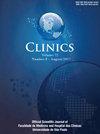早期吗啡给药对脓毒症合并慢性心力衰竭患者的影响
IF 2.4
4区 医学
Q2 MEDICINE, GENERAL & INTERNAL
引用次数: 0
摘要
有慢性心力衰竭(CHF)病史的脓毒症患者吗啡的使用、时机和剂量的研究很少,吗啡给药是否影响脓毒症的生存尚不清楚。本研究旨在阐明有CHF病史的脓毒症患者早期给予吗啡与30天死亡率的关系。方法利用重症监护医学信息市场(MIMIC-IV)数据库的数据,对感染性CHF患者进行回顾性队列研究。作者采用Cox比例风险模型和倾向评分匹配(PSM)分析早期给药吗啡(入院24 h内)对30天死亡率的影响。结果分析了7424例成人感染性CHF患者,其中6495例早期使用吗啡治疗,929例不使用吗啡治疗。与非吗啡组相比,早期吗啡组的30天死亡率显著降低(匹配后16.4% vs. 25.7%,绝对风险降低(ARR) 9.3%(95%置信区间[95% CI 5.1-13.6], p <;0.001)。在败血症合并CHF患者中,在所有调整变量中,早期给药吗啡与30天死亡率降低相关(HR = 0.539-0.735, p <;0.001)。PSM后,仅15 mg吗啡与较低的30天死亡率相关(HR = 0.233, 95% CI 0.086-0.632, p <;0.001)。结论:本研究揭示了早期给药吗啡与降低败血症合并CHF患者经风险调整后的30天死亡率之间存在显著关联。本文章由计算机程序翻译,如有差异,请以英文原文为准。
The impact of early morphine administration on septic patients with pre-existing chronic heart failure
Background
The use, timing, and dosage of morphine in septic patients with a history of Chronic Heart Failure (CHF) are poorly studied, and it is still unclear if morphine administration affects sepsis survival. This study aims to elucidate the relationship between early morphine administration and 30-day mortality among septic patients with a history of CHF.
Methods
Utilizing data from the Medical Information Mart for Intensive Care IV (MIMIC-IV) database, this retrospective cohort study focuses on septic patients with CHF. The authors investigated the effects of early morphine administration (within 24 h of ICU admission) on 30-day mortality, employing Cox proportional hazards modeling and Propensity Score Matching (PSM) for analysis.
Results
The authors analyzed 7424 adult septic patients with CHF, among whom 6495 received early morphine and 929 were managed without morphine. The early morphine group exhibited a significantly lower 30-day mortality rate compared to the nonmorphine group (post-matched 16.4 % vs. 25.7 %, Absolute Risk Reduction (ARR) 9.3 % (95 % Confidence Interval [95 % CI 5.1–13.6], p < 0.001). Among septic patients with CHF, early morphine administration was associated with a reduction in 30-day death in all adjusted variables (HR = 0.539‒0.735, p < 0.001). After PSM, only <15 mg of morphine was correlated to a lower 30-day mortality rate (HR = 0.233, 95 % CI 0.086–0.632, p < 0.001).
Conclusion
This investigation reveals a significant association between the early administration of morphine and reduced risk-adjusted 30-day mortality in septic patients with CHF.
求助全文
通过发布文献求助,成功后即可免费获取论文全文。
去求助
来源期刊

Clinics
医学-医学:内科
CiteScore
4.10
自引率
3.70%
发文量
129
审稿时长
52 days
期刊介绍:
CLINICS is an electronic journal that publishes peer-reviewed articles in continuous flow, of interest to clinicians and researchers in the medical sciences. CLINICS complies with the policies of funding agencies which request or require deposition of the published articles that they fund into publicly available databases. CLINICS supports the position of the International Committee of Medical Journal Editors (ICMJE) on trial registration.
 求助内容:
求助内容: 应助结果提醒方式:
应助结果提醒方式:


